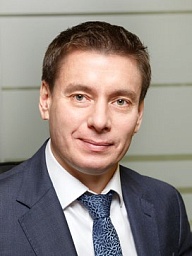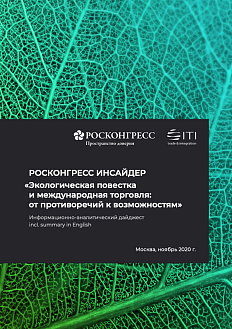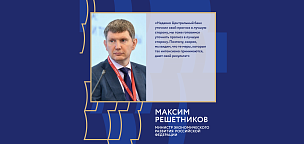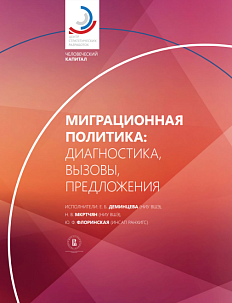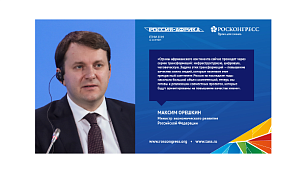Our cooperation began in late 2017 when REC acquired a share in Afreximbank and became the third-largest shareholder among those represented by non-African financial institutions, export credit agencies and private investors. Afreximbank is our reliable partner in Africa that helps us to promote Russian products on the continent. At the moment, there are two major areas of business. Firstly, we are developing certain projects to minimize financial risks. More than 10 projects are currently under consideration in Egypt, Zimbabwe, Zambia, Nigeria and Angola. In 2019, we closed the first deals. For example, Eximbank of Russia confirmed two letters of credit issued by Afreximbank for the benefit of Uralkalis affiliate. This will make it possible to supply Russian fertilizers to Zambia to the value of $45 million. Secondly, we promote Russian export products through Afreximbanks channels by participating in joint business missions and exhibitions as well as searching for partners. The Russia-Africa economic conference held this summer in Moscow is the latest most significant event organized within the annual meeting of shareholders of Afreximbank. It yielded significant arrangements in some business areas.
What could be considered the key projects recently implemented by Russia and African countries?
African countries are highly interested in Russian farming machinery, motor vehicles (KAMAZ, GAZ Group, URAL, UAZ) and special equipment. Farming machinery produced by ROSTSELMASH is already supplied to the RSA; LADA assembles vehicles in Egypt, RENAULT supplies Russian made car bodies to Algeria. Russian companies participate in projects involving the maintenance and modernization of power stations, oil development and transportation, and the construction of facilities for chemical and metal mining industries in Africa. Another important area is the supply of agricultural products to Africa. For example, Egypt is the largest importer of Russian grain.

A joint industrial area is being developed in Africa. What preferences will Russian companies get? Who are the residents?
The Russian Industrial Zone (RIZ) is a part of the International Cooperation and Export project. We will gradually develop a unique complex on an area of 525 hectares at the East Port Said site of the Suez Canal Economic Zone. Russian exporters and suppliers will be able to set up their production facilities near the promising markets of the Middle East and Africa. The residents will be able to use the advanced engineering and utility infrastructure, namely roads, safety systems, water and electric power supply systems, etc. The manufacturers will be offered an optimal site to develop business, namely a basic site for the development of production facilities (greenfield) or ready-made production facilities (brownfield). The residents will enjoy various exemptions and concessions, special export and import customs duties, salary benefits and special Suez Canal tolls. There will be a possibility to repatriate 100% of the collected earnings back to Russia with no Egypt partners involved. 25 agreements of understanding have already been signed with Russian companies, which provide for their participation in the RIZ as potential residents. These include manufacturers of biochemistry products and fertilizers, construction materials and metal structures, composite materials, farming machinery, electrically-powered and oil and gas equipment, dock facilities, etc.
Africa traditionally attracts major state-owned Russian companies. Could this market be interesting to small and medium-sized businesses and to what extent?
The number of companies that consider African markets attractive for expanding their export operations is constantly growing. The REC Group is ready to engage various financial and non-financial support measures to promote export and implement joint projects. For example, Nigeria is planning to construct and upgrade the existing integrated iron- and-steel works with the participation of Russian contractor. Russian exporters may focus on the following niches when planning to expand their operations: the motor vehicles and car assembly sector, railroad infrastructure development and modernization, wheat milling, oil processing equipment and much more.
The development of trade and economic relations is limited by poorly developed logistical routes and poor knowledge of local markets. How can these problems be solved?
We are systematically developing special export routes. They speed up cargo delivery, which is especially important for perishable goods. It is very important for trade and economic rotations to further strengthen the partnership with the African countries in the field of logistics. To do this, we are actively introducing electronic document management systems to be used by all the countries and a single multimodal transport document. We are assisted by Russian Railways, the Federal Customs Service, and other partners. The development of new technological supply chains and new logistics products for exporters will increase non-commodity export to African countries and will help to enhance transport service export. These are the primary objectives that should be addressed by us in the framework of the International Cooperation and Export project.

Russia is interested in increasing commercial and industrial turnover and know-how export as well. Can you share any successful examples in this regard?
We know that know-how export is tightly connected to energy and power plant construction projects. There are examples in the oil sector related to the construction of pipelines and in the mining industry. The delivery of tangible objects in these areas is often followed by the introduction and dissemination of advanced Russian technologies and know-how.

What does REC expect from the Summit and the Forum? What documents do you plan to sign?
The REC Group is going to execute a series of cooperation agreements with its African partners in key economic sectors. First of all, it is the energy sector, the oil sector, transport and infrastructure, iron and steel industry, the chemical industry, mechanical engineering and the agro-industrial complex. We have achieved significant progress in all these areas over the past year. The Russia-Africa Summit and the Economic Forum will become a milestone in the new history of our relationship. I hope Russian and African companies will see new perspectives thanks to the events to be held in Sochi. The strengthened cooperation between Russia and African countries in the political sphere must be followed by the logical development of economic ties. I hope all the forum participants are able to successfully use this unique platform to achieve their business goals!



